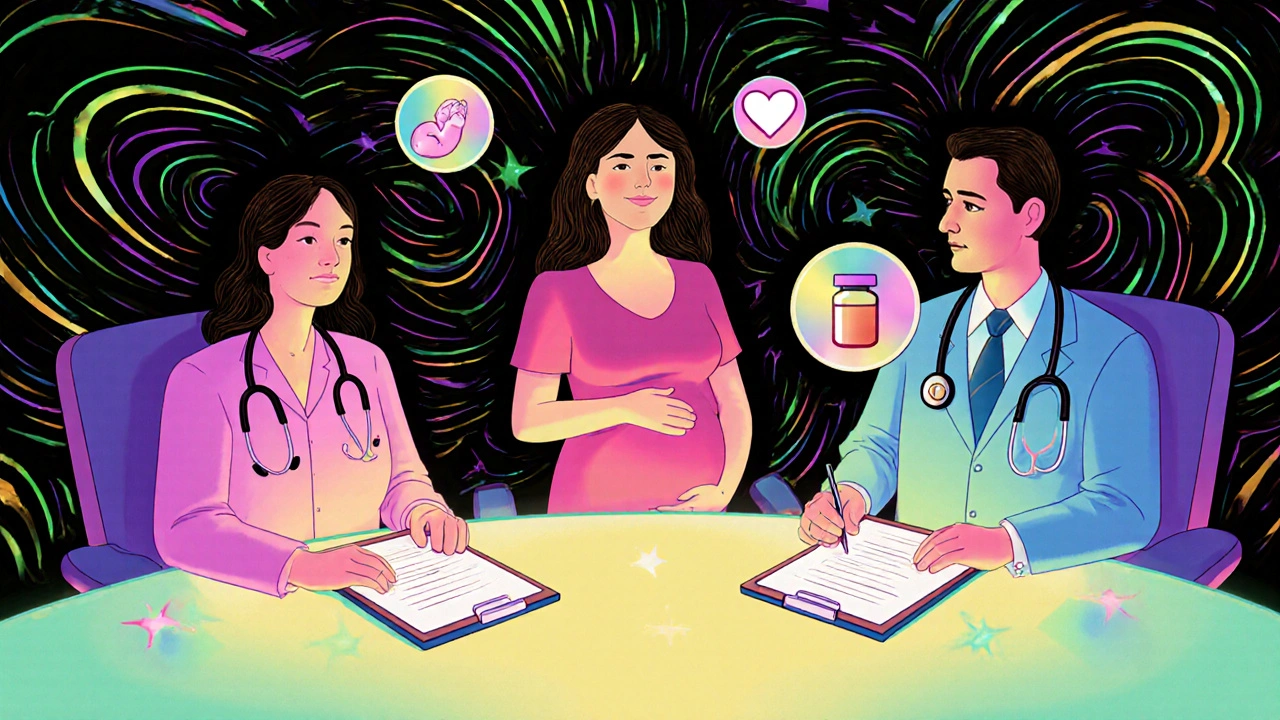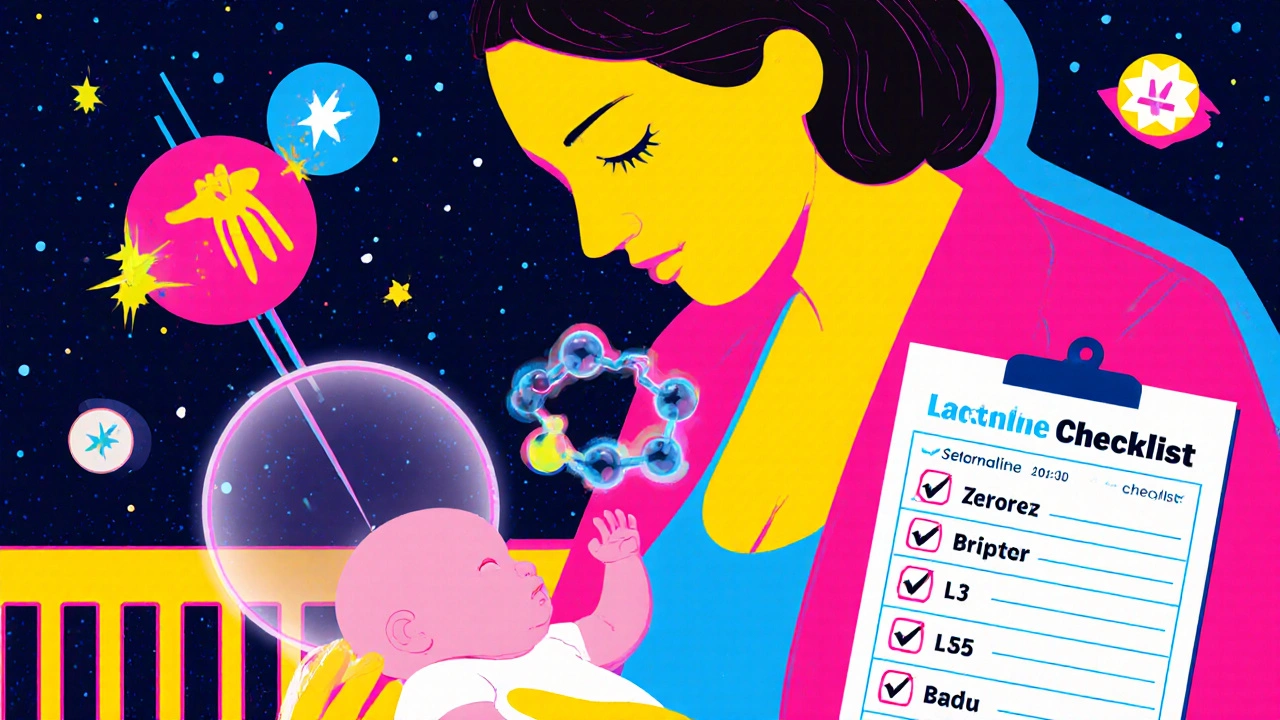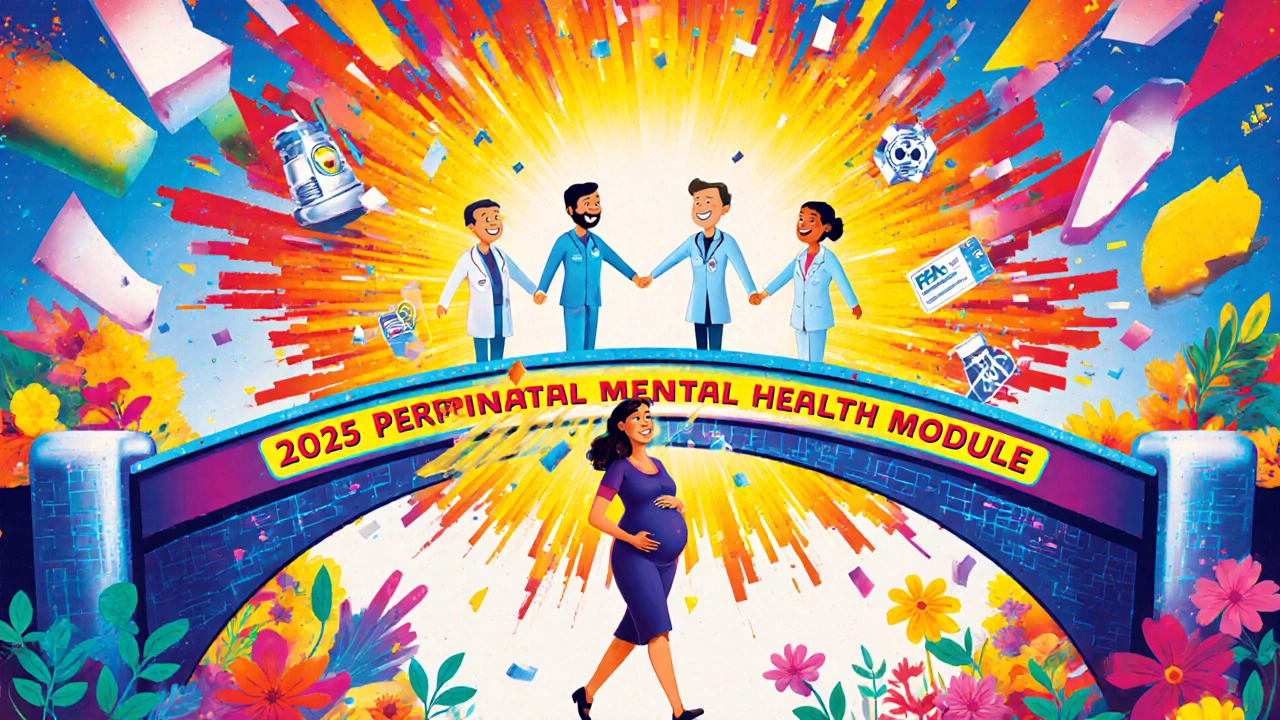How to Coordinate Care Between OB/GYN and Psychiatrist for Medications During Pregnancy and Breastfeeding
 Nov, 14 2025
Nov, 14 2025
When you’re pregnant or breastfeeding and need psychiatric medication, you’re not just managing your mental health-you’re managing two lives. That’s why coordinating care between your OB/GYN and psychiatrist isn’t just helpful. It’s essential. Too many women get caught in the middle: one provider says to stay on sertraline, another says to stop. One gives you a risk chart, another says, ‘It’s probably fine.’ This confusion leads to unnecessary medication stops, worsening depression, and even hospitalizations. But there’s a better way.
Why Coordination Isn’t Optional
About 1 in 5 women experience depression or anxiety during pregnancy or after birth. Left untreated, that increases the risk of preterm birth by 40%, low birth weight by 30%, and even difficulties bonding with your baby. But some medications carry small risks too. Sertraline, for example, has a 0.5% absolute risk increase for heart defects-compared to a 1% baseline risk in the general population. That’s why you need both specialists talking to each other. Your OB/GYN knows how pregnancy changes your body-your blood volume goes up by 40-50%, your liver processes drugs faster, and your kidneys filter more. Your psychiatrist knows how those changes affect your medication levels. Without them working together, you’re flying blind.What Medications Are Safe? The Evidence
Not all antidepressants are created equal during pregnancy. The American College of Obstetricians and Gynecologists (ACOG) recommends sertraline and escitalopram as first-line choices. Why? They cross the placenta less than others, have fewer active metabolites, and are backed by data from over 15,000 pregnancies tracked by the National Pregnancy Registry for Psychiatric Medications. Paroxetine, on the other hand, is linked to a higher risk of heart defects and is no longer recommended as a first option. For bipolar disorder, mood stabilizers like lithium and lamotrigine are often continued-but valproate is strongly avoided. It raises the risk of major birth defects to nearly 11%, compared to 2-3% in the general population. If you’re on a benzodiazepine for anxiety, ACOG advises against long-term use. Short-term, low-dose use under weekly psychiatrist supervision is acceptable if absolutely needed. During breastfeeding, most SSRIs are considered safe. Sertraline is the top pick again-only tiny amounts pass into breast milk, and studies show no developmental delays in infants. Fluoxetine? Not so much. It sticks around longer in the baby’s system. Always check the LactMed database, maintained by the NIH, for updated safety ratings.When and How to Start Coordination
Don’t wait until you’re 20 weeks pregnant and feeling overwhelmed. The best time to start is before conception. If you’re planning a pregnancy, schedule a joint consultation with both your OB/GYN and psychiatrist. They’ll review your current meds, adjust doses if needed, and set up a monitoring plan. This isn’t just a one-time meeting-it’s the foundation. If you’re already pregnant, aim for your first coordinated visit by 8-10 weeks. After that, communication should happen at least every four weeks if things are stable. If you’re having a flare-up or your dose is being changed, weekly check-ins are standard. Most successful practices use standardized templates that include:- Current medication, dose, and timing
- Protein binding percentage (sertraline is 98%)
- Placental transfer rate
- Lactation risk category (L1-L5)
- Maternal relapse risk if discontinued
- Infant exposure estimate

What Gets in the Way?
The biggest barrier? Broken systems. A 2021 study found 67% of OB/GYNs and psychiatrists use different electronic health records that don’t talk to each other. That means someone has to fax records, call between appointments, or hope the patient remembers to bring up a change. It’s inefficient-and dangerous. Insurance is another hurdle. In the UK and US, prior authorizations for psychiatric visits can take over two weeks. That’s a lifetime in perinatal mental health. If you’re waiting for approval and your symptoms are worsening, tell your OB/GYN. They can often prescribe a short-term bridge or escalate the request. Some providers still think, ‘I’m not a psychiatrist-I shouldn’t prescribe this.’ But ACOG’s guidelines say otherwise. OB/GYNs are trained and encouraged to initiate treatment for mild to moderate depression and anxiety. You don’t need to wait for a psychiatrist to see you first. The goal is collaboration, not gatekeeping.What Works in Real Life
Kaiser Permanente’s integrated model shows what’s possible. Their teams hold joint virtual visits where both providers are on the call. Patients get a printed Reproductive Safety Checklist-rated 1 to 10 for both relapse risk and medication risk. One woman, 32, pregnant with her second child, had stopped her antidepressant after a bad experience with her first pregnancy. She was anxious, sleeping poorly, and crying daily. Her OB/GYN referred her to a psychiatrist who was part of the same system. Within two weeks, they restarted sertraline at 50mg, monitored her levels, and adjusted based on her symptoms and trimester. She delivered a healthy baby and breastfed for 10 months without relapse. On Reddit’s r/PPD community, 68% of users reported conflicting advice. One woman was told by her OB/GYN to stop all meds. Her psychiatrist said she’d likely relapse. She chose to stop. Three weeks after birth, she was hospitalized for severe postpartum psychosis. That’s not an outlier. That’s what happens when coordination fails.
What’s New in 2025?
The landscape is changing fast. In early 2024, the FDA updated medication labels to include specific coordination recommendations. Sertraline’s label now says: ‘Coordination with obstetric provider recommended for dose adjustment beginning at 20 weeks gestation due to increased clearance.’ That’s huge. It means prescribing info now reflects real-world clinical practice. New tools are rolling out too. Epic Systems’ Perinatal Mental Health Module, used by over 1,200 U.S. hospitals, now automatically alerts psychiatrists when an OB/GYN prescribes an antidepressant. In the UK, NHS Digital is piloting similar systems. AI-driven risk models are being tested in research trials-predicting which women are most likely to relapse based on genetics, past episodes, and stress levels. These aren’t sci-fi. They’re coming to your clinic.Your Next Steps
If you’re pregnant or planning to be, here’s what to do:- Ask your OB/GYN if they work with a perinatal psychiatrist. If not, ask for a referral.
- Request a joint appointment-or at least a written care plan signed by both providers.
- Bring your current medication list and any past mental health records.
- Ask: ‘What’s the risk of stopping this? What’s the risk of keeping it?’ Get numbers.
- Use the National Pregnancy Registry (www.pregnancyregistry.org) to enroll if you’re on medication-it helps future moms.
- If you’re breastfeeding, check LactMed or ask your pharmacist for the latest safety rating.
Can I safely breastfeed while taking antidepressants?
Yes, most antidepressants are safe during breastfeeding. Sertraline is the most studied and preferred choice-it passes into breast milk in very small amounts. Escitalopram and citalopram are also considered low risk. Fluoxetine and paroxetine are less ideal because they linger longer in the baby’s system. Always check the LactMed database for the latest safety ratings, and monitor your baby for signs of irritability or poor feeding. If you’re concerned, your pediatrician can check the baby’s blood levels, though this is rarely needed.
What if my OB/GYN says to stop my meds but my psychiatrist says to keep them?
This is a red flag. Neither provider should be making this decision alone. Ask for a joint consultation immediately. If your providers won’t coordinate, ask your OB/GYN to refer you to a perinatal mental health clinic or ask your psychiatrist to contact your OB/GYN directly. You have the right to care that’s coordinated-not contradictory. If you’re in the UK, contact your local perinatal mental health team through the NHS. In the US, organizations like Postpartum Support International can help connect you with coordinated care providers.
Is it safe to stay on mood stabilizers like lithium during pregnancy?
Lithium is generally considered safe to continue during pregnancy, especially for women with bipolar disorder who have had severe episodes. The main concern is a small increased risk of a rare heart defect called Ebstein’s anomaly-about 1 in 1,000 births when taking lithium, compared to 1 in 20,000 in the general population. Your doctor will monitor your lithium levels closely, adjust your dose as your body changes, and do a detailed anatomy scan around 20 weeks. Stopping lithium without medical guidance carries a much higher risk of relapse, which can lead to dangerous outcomes for both you and your baby.
How often should my OB/GYN and psychiatrist communicate?
For stable conditions, communication every 4 weeks is standard. If your dose is being adjusted, you’re experiencing new symptoms, or you’re in the third trimester (when drug metabolism changes fastest), weekly contact is recommended. The communication doesn’t have to be a full meeting-it can be a secure message through your EHR, a shared note, or a quick call. What matters is that both providers know what’s happening. Documentation should include medication changes, side effects, and risk-benefit discussions. If your providers aren’t communicating this often, ask why.
What if I’m on multiple psychiatric medications?
Polypharmacy-taking more than one psychiatric drug-should be avoided during pregnancy if possible. Studies show a 30% lower risk of neonatal complications with single-agent therapy. If you’re on two or more meds, your psychiatrist and OB/GYN should review whether all are still necessary. For example, if you’re on an antidepressant and a sleep aid, can the sleep issue be managed without medication? If you have bipolar disorder and are on lithium and an antipsychotic, they’ll assess whether the antipsychotic is essential or if lithium alone can be optimized. Always question the need for each drug. Less is often safer.
Can I get help if I don’t have insurance or live in a rural area?
Yes. In the UK, all pregnant women have access to NHS perinatal mental health services regardless of insurance. Ask your midwife or GP for a referral. In the US, federally qualified health centers and telehealth programs like Project TEACH NY offer free or low-cost coordination services. Many universities with maternal mental health programs also offer free consultations. The National Pregnancy Registry offers free enrollment and follow-up care. You don’t need private insurance to get evidence-based care. If you’re struggling, call Postpartum Support International at 1-800-944-4773-they’ll connect you to local resources.
Ankit Right-hand for this but 2 qty HK 21
November 16, 2025 AT 05:07This whole article is a corporate shill for Big Pharma. You think sertraline is safe? Tell that to the 12% of babies born with withdrawal symptoms in 2023 CDC data. They don't tell you that. They don't tell you that the FDA label says 'possible neonatal adaptation syndrome' but the marketing says 'safe'. The system is rigged. You're being sold a lie wrapped in statistics.
Oyejobi Olufemi
November 17, 2025 AT 17:32Let me be clear: the entire Western medical-industrial complex is built on fear, not science. You speak of 'risk charts'-but who funded them? Who owns the National Pregnancy Registry? Who profits when you stay on antidepressants for 3 years postpartum? The data is manufactured. In Nigeria, we use ginger, prayer, and community. No pills. No coordination. No bureaucracy. And our babies are healthier. Your 'evidence' is colonial medicine dressed in lab coats.
Daniel Stewart
November 19, 2025 AT 02:48It’s fascinating how we reduce existential human experiences-like postpartum depression-to pharmacological risk matrices. The real tragedy isn’t the 0.5% cardiac anomaly risk-it’s the erasure of maternal agency. When we outsource emotional survival to a dosing algorithm, we’re not protecting life-we’re industrializing motherhood. The question isn’t ‘what’s safe?’ but ‘who gets to define safety?’
Jamie Watts
November 20, 2025 AT 12:38Look I’ve been through this twice and let me tell you nobody cares until you’re in crisis. OBs don’t know shit about psych meds and psychiatrists don’t know shit about pregnancy physiology. That’s why you need to be your own advocate. Print out the LactMed sheet. Print out the ACOG guidelines. Bring them to both appointments. If they roll their eyes? Find new providers. This isn’t rocket science it’s basic patient rights. And stop waiting for permission to take care of yourself.
John Mwalwala
November 21, 2025 AT 16:38Did you know that the 2024 FDA update on sertraline clearance was quietly pushed through after lobbying by Eli Lilly and Pfizer? The Perinatal Mental Health Module in Epic? It’s not a tool-it’s a surveillance system. Every time your OB prescribes an SSRI, it triggers an AI flag that sends your data to insurance underwriters who adjust your premiums. They’re not helping you-they’re profiling you. And that 'shared decision-making template'? It’s a compliance checklist for liability, not care.
Deepak Mishra
November 22, 2025 AT 05:15OMG I just found out my OB and shrink don’t talk and I’ve been on sertraline since week 8!!! 😱 I thought they were coordinating!! I’m so mad right now!! I’m gonna call them both at the same time and make them video chat!! 🤯😭 I can’t believe this is still a thing in 2025!! Someone please tell me I’m not the only one??
Rachel Wusowicz
November 23, 2025 AT 01:11They say 'the system is broken'-but what if it was designed this way? What if fragmentation is the point? If providers were truly coordinated, if data flowed freely, if mothers weren’t forced to become medical detectives-then we wouldn’t need Postpartum Support International. We wouldn’t need Reddit threads with 10,000 replies. We’d just… be cared for. The fact that you have to fight for coordination proves this isn’t a failure-it’s a feature.
Diane Tomaszewski
November 23, 2025 AT 03:19I had my first baby and stopped everything because I was scared. Then I had a breakdown so bad I couldn’t hold my son. My OB said 'try therapy' and my psychiatrist said 'you need meds'. I didn’t ask them to talk to each other. I should have. I didn’t know it was okay to demand that. Now with my second, I made them sit in a Zoom call together. They made a chart. I cried. It was the first time I felt like I wasn’t alone. You don’t need to be a warrior. You just need to ask.
Dan Angles
November 23, 2025 AT 08:45It is imperative that all stakeholders-clinicians, institutions, and patients-recognize the ethical obligation to facilitate interprofessional collaboration in perinatal psychiatric care. The absence of standardized communication protocols constitutes a systemic dereliction of duty. I urge all providers to adopt the ACOG-recommended shared documentation framework and to institutionalize quarterly interdepartmental case reviews. Patient safety is not negotiable.
David Rooksby
November 23, 2025 AT 22:07Look I’ve been in this game for 18 years and I’ve seen every scam going. The 'evidence' they cite? Half of it’s from industry-funded studies with cherry-picked cohorts. And don’t get me started on LactMed-half the entries are outdated and nobody updates them. My mate’s sister was on sertraline, baby had a rash, they said 'it’s fine', turned out it was a drug reaction. The system is a joke. They’re all just guessing. And you? You’re the lab rat. You’re the one who has to risk it all because no one’s got the guts to say 'we don’t really know'. So yeah, go ahead and print your checklist. But don’t fool yourself-you’re still gambling with your kid’s life.